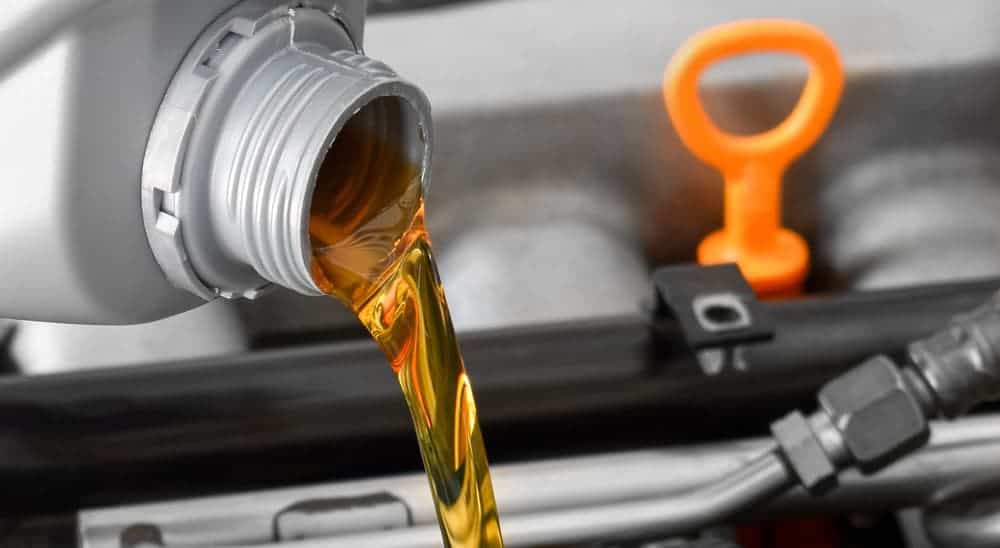Every vehicle has a lot of moving parts, different systems, and hundreds of components working together to provide you with a functioning and driveable machine. You don’t necessarily need to know how everything works in your car to be able to drive it, but it could help your overall owner experience if you have knowledge of a few key items. For instance, if you’ve hit the recommended mileage for your next oil change service or your car notifies you it’s time for an oil change, you might want to understand why you need an oil change. It could also be helpful to know what motor oil is and why it’s such an essential part of your vehicle’s makeup.
Here, we’ll go over 10 common things you need to know about motor oil:
1. What Is Motor Oil?
If you think about what oil is in general, you may imagine someone striking it rich with a crude oil well in Texas, or you might picture an oil tanker out in the ocean. This is part of the history of where oil comes from, but it doesn’t really explain what oil does for us.
It has many uses, but for the average individual the most interaction you’ll have with oil is using it in your vehicles. Oil is an absolutely essential part of any automotive system that uses an engine because it acts as a lubricant between all the moving parts. You don’t have to completely understand what’s going on under the hood of your car, but just know that the different parts of the engine are working hard to produce energy for your vehicle to move.
These parts are coming into contact with each other, which produces a lot of friction and heat. With the presence of oil, the friction between moving parts is reduced, and you end up with less heat production as well. Basically, the oil helps prevent your car from overheating and causing serious mechanical issues.
In addition to the benefit of lubrication, oil also enhances other parts of your vehicle. Oil collects impurities and protects your engine from wearing out. When your oil is changed, the old oil with the impurities is removed, and new, fresh oil is added.

2. How Often Should I Change My Oil?
For most of the history of automobiles, there hasn’t been an automatic message from your vehicle to let you know when your oil should be changed. It was up to the know-how and general knowledge of trained mechanics to let you know when your oil should be changed, depending on many different factors.
Today, we have the benefit of modern vehicles that can let us know the approximate timing of oil changes. With advanced technology, the vehicle’s systems and sensors can calculate when we need an oil change service based on the mileage of the vehicle, when the last service occurred, and other factors.
Still, not every vehicle has these features. Your best bet on knowing when your vehicle needs an oil change is to take it to a professional and get their opinion. Unless, of course, you know your way around a vehicle and can check things over yourself. Most vehicles can go thousands of miles before needing an oil change, but the type of vehicle and the type of driving you do plays a huge role in exactly how many thousands of miles it will be.
3. What is the “Every 3,000 Miles” Rule?
For many years, the rule of thumb on oil changes was every 3,000 miles. It’s an easy number to remember, and this type of mileage typically occurs over the course of a few months of average driving. So in the course of a year, you may end up needing two to four oil changes, depending on your mileage.
In recent times, the “every 3,000 miles” rule doesn’t make as much sense. Vehicles have become more advanced, and so has the actual oil we use. Instead of following this rule, consult with a trained professional that knows your type of vehicle about how often you should be getting an oil change service.
4. Are There Different Kinds of Oil?
There is more than one universal type of oil for vehicles. In fact, there are many different types of oil, so it makes sense to do a little research on what they are. Not every vehicle is the same, and your vehicle may not take the same oil as another vehicle.
In general, oil has been divided into three categories: standard, synthetic blend, and full synthetic. Your standard oil is typically the least expensive type of oil and will work with most vehicles just fine. Just because it’s less expensive than other types of oil doesn’t mean it won’t work well — you may just need to change your oil more often.
Hybrid and synthetic oils may contain more in their makeup than just oil. Additives and other added components can help your engine run smoother and protect vital parts of your vehicle. This may allow your vehicle to drive longer without needing an oil change service.
5. What Kind of Oil Does My Vehicle Take?
Most of the time, vehicles aren’t limited to one specific type of oil. Most vehicles will function fine with your standard oil types, but your mechanic may recommend a full synthetic or synthetic blend. These types are normally more expensive than standard oil, but they could increase the lifespan of your engine and help protect your vehicle.
To find out what type of oil is recommended for your vehicle, consult your owner’s manual and/or speak with a trained mechanic.
6. What Are the Numbers on an Oil Canister?
Oil canisters present an intimidating prospect if you don’t know anything about oil, but the numbers can be broken down fairly simply. Just keep in mind that you should follow the oil recommendations of your vehicle’s manufacturer.
In short, the numbers you see on an oil can represent the viscosity of the oil, while the “W” stands for winter. So, depending on where you live, you might go with a lower number for colder temperatures or a higher number for hotter temperatures. Most people use oils that function well for a range of temperatures that don’t get too extreme.
7. Can I Change Motor Oil Myself?

You can definitely change your vehicle’s oil yourself, and it’s not too difficult to do, but you should always learn the proper way of doing it beforehand. Perhaps learning from an accomplished friend or colleague or your local mechanic first would be the best way to get started. It’s better to learn first instead of winging it and messing something up with your vehicle.
8. Where Can I Buy Oil?
Motor oil is sold in stores all over the world, including auto repair shops and general-purpose stores like Walmart and Target. You can easily find oil at gas stations, as well.
9. How Do I Get Rid of Old Oil?
If you change your own oil, it’s good to know where you can safely get rid of the old oil. Oil can’t be thrown out like your regular waste. Instead, specific oil disposal locations are available to take your waste oil. In general, places that sell motor oil have a high likelihood of accepting back old oil to recycle it.
10. Do All Cars Take Oil?
Not all cars need oil, at least not for an engine. For example, electric cars don’t use engines, so they don’t need oil for an engine. Electric cars may still need oil for certain moving parts, but don’t expect to need oil changes with these types of vehicles. There’s very little degradation of parts involved with electric cars, so there’s not as much replacing of different components.

